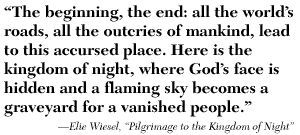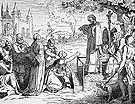
|
|
|

|

|

|

|
|
Click on an image to see a larger, more detailed picture.
|
|
|
|
|
| PROLOGUE: Roots of the Holocaust |

|
pg. 17 |

|
|
|
|
| |
|
|
|
|
|
|
| |
Night,
Elie Wiesel's famous Holocaust memoir, tells what happened to him in Auschwitz, the Nazi concentration, forced-labor, and extermination camp in Poland that he entered as a teenager in May 1944. The narrative concludes in April 1945 as Wiesel looked into a mirror. Seeing oneself in a mirror is a small thing, but the boy had not done so since he and his family were deported from Sighet, their hometown in Hungary, more than a year before. What Wiesel saw, moreover, was not ordinary at all. "From the depths of the mirror," he wrote, "a corpse gazed back at me." Even though he was officially "liberated" from Auschwitz, Wiesel could never be free from the catastrophe that had befallen him and his people. He and the other survivors had witnessed so much senseless violence and useless dying in "the kingdom of night" that their living would ever more include the death-with-life that he must have recognized when he set himself and gazed into the mirror. "The look in his eyes, as they stared into mine, has never left me," he wrote. From time to time, Elie Wiesel has returned to Auschwitz. He has done so first and foremost as a witness for the dead and the living. But he has also returned because his accomplishments as a distinguished author, influential humanitarian, and Nobel Peace Prize recipient in 1986 have given him leadership responsibilities for preserving memory of the Holocaust, including accurate conservation of its most important sites. In the summer of 1979, he led a delegation to visit significant places in the Holocaust's history. Auschwitz-Birkenau was among them. The main killing center in the large Auschwitz system of camps, Birkenau was the place where more than one million Jews were gassed. The visitors accompanying Wiesel were from the President's Commission on the Holocaust. It had been charged by Jimmy Carter, the American president at the time, to recommend an appropriate Holocaust memorial for the United States. That initiative resulted in the opening of the United States Holocaust Memorial Museum in Washington, D.C., in 1993. During the Auschwitz stop on his 1979 journey, Wiesel read "Listen to the Wind," a poem he had written. The poem urged people to listen--to listen to the wind, stones, and sky--in a place that Wiesel aptly called "the grave of man's heart." Later in 1979, reflecting on his "Pilgrimage to the Kingdom of Night," as his November 4 article in The New York Times called it, Wiesel referred to Auschwitz-Birkenau as "the beginning, the end: all the world's roads, all the outcries of mankind, lead to this accursed place.

|

|

|

|

|
|

Many medieval European monarchs expelled Jews or condemned them to death. Philip V of France orders this Jewish woman to burn at the stake.
Photo: Archive Photos: F11EMBL
|
|
|
|
|
| PROLOGUE: Roots of the Holocaust |

|
pg. 17 |

|
|
The Holocaust Chronicle
© 2009 Publications International, Ltd.
|
|
